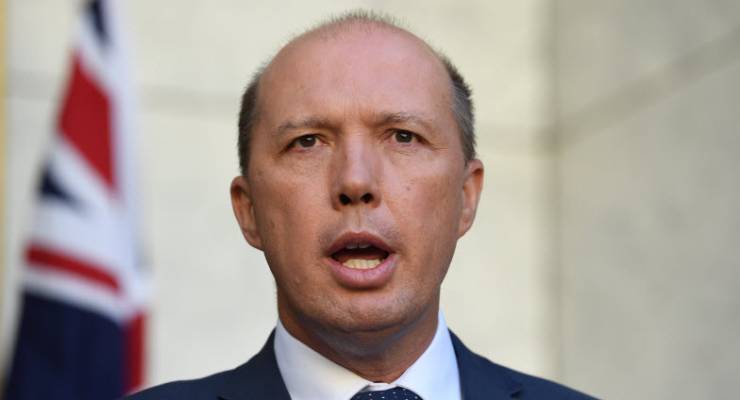
Immigration Minister Peter Dutton’s new security portfolio gives him sweeping powers to impact on the rights of Australian citizens and those who are resident in this nation. Such powers should be exercised cautiously and only after careful deliberation given the impact they could have on rights such as liberty, privacy and reputation.
A decision handed down yesterday by the full Federal Court of Australia (Justices Edward Griffith, Richard White and Robert Bromwich) in which the court overturned Dutton’s hasty revocation of the visas of two men with criminal convictions and alleged association with bikie gangs, does not provide comfort about how Dutton might exercise his new powers.
Dutton cancelled the visas of Helder Carrascalao and Tomasi Taulahi late on December 14 last year.
Carrascalao was born in East Timor, Taulahi in Tonga. They both had criminal records and were alleged to be associated with motorcycle gangs. Dutton cancelled their visas because of these factors. But at 4.15pm on December 14, 2016, the full court of the Federal Court overturned these cancellations.
It is what happened after 4.15pm that became one of the grounds of the two men’s latest challenge to Dutton.
After the 4.15pm decision there was a flurry of activity involving the Department of Immigration, Dutton’s office and the lawyers for the two men. At 7.37pm and 7.43pm about 370 pages relating to Carrascalao and 300 pages concerning Taulahi were sent by the Department of Immigration to the minister’s office.
Dutton made his decision to cancel Taulahi’s visa at 8.18pm and Carrascalao’s visa at 8.25pm.
While the Federal Court could not determine how long Dutton spent on each submission it noted:
“[What] is clear, however, is that, assuming a 5 minute delay in providing hard copies of the material to the Minister after they were received electronically by his personal staff, the Minister had, at most, 30 minutes to consider all the Taulahi material. Assuming that he was unable to turn his attention to the Carrascalao material (in either its original or revised form) during that period, he had, at most, 13 minutes to consider the relevant material before he decided at 8:25 pm to cancel Mr Carrascalao’s visa (i.e. the six minute period between 7:42 pm when, on the stated assumption, hard copies of the original Carrascalao material were placed before the Minister until 7:48 pm when, on the same assumption, the Taulahi material were placed before him, and the seven minute period between 8:18 pm to 8:25 pm, being the interval between the finalisation of the two visa cancellation decisions).”
The court said 43 minutes “represents an insufficient time for the Minister to have engaged in the active intellectual process which the law required of him in respect of both the cases which were before him”.
The court noted:
“[The] respective statements of reasons adopted by the Minister are replete with statements to the effect that the Minister had noted, found, accepted, had regard to, considered and recognised particular matters. These should not be understood as mere verbal formulae. They should signify that the Minister had engaged intellectually with each particular matter and had positively formed the state of mind which each conveys. It is reasonable to suppose that the formation of these multiple states of mind would occupy a Minister for some considerable time. On the timelines outlined earlier, that does not seem to have been possible in the present case.”
The revelations in the Carrascalao and Taulahi appeal about how hastily Dutton made a critical decision impacting on the lives of the two men and their families demonstrates the critical importance of the need for the courts to scrutinise the use of ministerial discretion — despite the campaign from DWutton, Malcolm Turnbull and their media allies against such scrutiny.
And, as importantly, the way in which Dutton dealt with the cases of Carrascalao and Taulahi is deeply concerning given that in his new role he will be asked to exercise judgment and discretion on a daily basis.








Dutton “engage intellectually”? No-one will top that today.
true!
Dutton has cancelled many such visas, sometimes for people with minor criminal convictions and sometimes for people who have lived in Australia since they were babies/small children, and therefore to all intents and purposes Australian even if they haven’t filled out a citizenship form. Just look at the number of character cancellations by Dutton compared to any previous minister.
The trouble is that because they are ‘criminals’ they do not arouse sympathy and so Dutton’s arbitrary, unaccountable and harsh exercise of his power gets very little publicity.
Perhaps now he can behave in the same way towards a much wider group of people, his small-minded, mean-spirited, ignorant and dictator-type tendencies will become more publicly known and the danger of putting one person in charge of a portfolio with such sweeping powers will become obvious.
And who said that government could not work efficiently? Unfortunately, we can’t seem to process most refugees anywhere near this quickly, particularly those subjected to “regional” processing.
When you are a cop or a Conservative, life is full of simple choices because everything is black and white with crisp edges. So when you are both …
Discretion. Dutton. Hah!